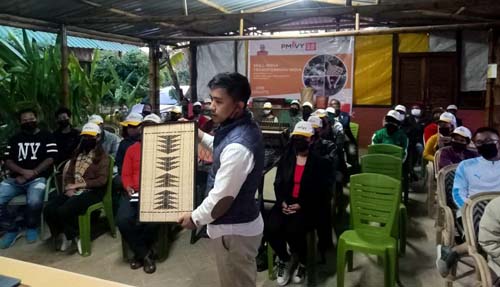SATURDAY, AUGUST 02, 2025
- Home
- Centre launches project to upskill cane, bamboo artisans of Nagaland
Centre launches project to upskill cane, bamboo artisans of Nagaland
Published on Dec 29, 2021
By EMN
Share

Dimapur, Dec. 28 (EMN): Minister of State for Skill Development and Entrepreneurship, Electronics and Information Technology, Rajeev Chandrasekhar, digitally launched a pilot project for up-skilling the cane and bamboo artisans of Nagaland under recognition of prior learning (RPL), a component of Pradhan Mantri Kaushal Vikas Yojana (PMKVY) on Tuesday.
The objective of the project was to upskill the local weavers and artisans to enhance their productivity through RPL assessment and certification in traditional handicrafts. The project aims to train over 4,000 craftsmen and artisans, stated a PIB report.
The project under RPL was expected to improve the competencies of the unorganised workforce. The artisans and weavers would be aligned with the standardised national skills qualifications framework (NSQF). It would also provide access to existing artisans and weavers to sustain their livelihoods and enhance their skills and technical knowledge, the report added.
Additionally, the pilot project would augment the marketing skills and techniques, promoting traditional and local crafts of cane and bamboo artisans. The initiative would add value to the traditional handicrafts through upskilling bridge modules through government of India certification.
Under the initiative, each batch would run for 12 days with 12 hours orientation and 60 hours bridge module. Further, after the orientation programme along with the bridge module, the artisans and weavers would be certified with the recognition of prior learning (RPL) Type-1. The training delivery partners for the upskilling initiative are Cane Concept and Handloom Naga.
Launching the project, Chandrasekhar said, “Traditional techniques of craft and artwork are a significant part of India’s rich heritage and there is an urgent need to preserve these skills. It is the vision of the Prime Minister, Narendra Modi, to create the right synergies and build infrastructure for the country’s youth, from North to South and from East to West.
“It is an article of faith for him that the future of India will be defined by the efforts, energy, and success of our youth population including the 4100 artisans who are going to be trained in Dimapur. This is not an isolated movement but a part of a larger vision of enabling youth with skills. Skilling the youth is an important mission for us and that is why we have gathered here to launch this event that hopefully trains and motivates artisans.
“When I recently traveled to Nagaland, I was made aware of the potential that the region has and its role in economic progression. This prompted the Ministry of Skill Development and Entrepreneurship to come up with this program in a bid to meet the economic aspirations of the local youth and take them on the path of development.”
Report stated that the project would be implemented in different phases including selection of artisans and weavers, training of trainers (ToT), and upskilling of artisans and weavers through RPL with a bridge module. It added that artisans and weavers would be selected from the traditional crafts clusters of Nagaland.
Post training, all the artisans and weavers would work in micro units which are set-up in their respective clusters. The beneficiaries would be encouraged to participate actively in external deliberation so that at the final stage, they would be able to manage market linkages on their own.
It further stated that the National Skill Development Corporation, the nodal implementation agency for the Ministry of Skill Development and Entrepreneurship, supported by Handicrafts and Carpet Sector Skill Council (HCSSC), would monitor the day-to-day progress of the project.

